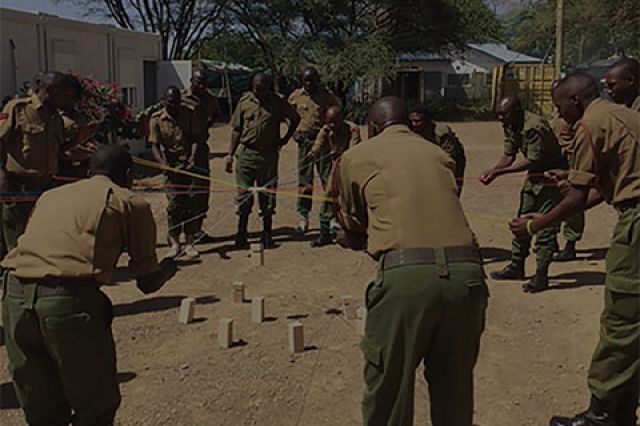Partnerships with Public Institutions, Experts and Civil Society: A Case Study from Public Security Training in Kenya

National public security units assigned to mining sites or other company operations often struggle with poor resources, capacities and equipment. At times, the training schools themselves lack staff expertise and equipment needed for effective instruction. In many operational contexts, high turnover of public security is also endemic. These issues have serious security implications for companies. Public security forces with limited knowledge of human rights principles who are assigned to company operations can present major challenges: lack of oversight on conduct, mistrust and adverse reactions from communities, use of force against civilians, work stoppage, delays in operations, grievances and judicial proceedings. High turnover of security officers also degrades the potential sustained impact of trainings and affects the professionalism of units. In the absence of a competent dedicated public security force, illegal armed actors may step in to fill the gap.
Companies have a significant opportunity to reduce these risks by consulting and working closely with the competent national authorities to support training programmes. Companies can contribute content, lessons learned, experiences and good practices and resolve problems with security provision in the long run. Companies can also contribute resources to national training programmes and engage in partnerships with security and human rights experts and civil society on the topic of training. This constitutes an investment in quality of security service provision, particularly in complex environments where public security may be weak or ineffective.
In 2012, oil companies discovered significant commercial oil reserves in Kenya’s Turkana region, with an estimated 560 million barrels projected to be exported. The Turkana region has been characterised by under-development, perennial drought and inter-ethnic conflicts. Community expectations related to the economic benefits of the oil discoveries led to violent protests against companies. Civil society cited that the discontent was due to inadequate community engagement by the government and companies, as well as a lack of transparency surrounding payments, leading to social conflicts in the region. The deployment of armed national police created risks with excessive use of force in clashes with demonstrators.
Beginning in 2017, the Geneva Centre for Security Sector Governance (DCAF) worked in partnership with Safestainable (a training consultancy) and Tullow Oil in order to develop a three-day training course entitled ‘Service with Dignity’. The training focused on police roles, responsibilities, ethics and professional practices, with policies and best practices drawn from National Police Service. After extensive engagement with stakeholders and a training need analysis, the project culminated in the organisation of four trainings of mixed groups of officers from Kenya’s police service, including members of the Critical Infrastructure Protection Unit (CIPU). The CIPU provides security to different industries across Kenya, including extractive industries, hydro-energy, airport infrastructure, construction and other sensitive industrial sites.
In total, a pool of 16 Kenyan police instructors were fully trained to provide human rights trainings to their counterparts. During the roll-out sessions, 80 police officers were trained (58 men and 22 women). The training led to positive behaviour changes in the Turkana police and has improved relations between the police, the company and the community. The Kenyan police and Tullow Oil reported that following the training, police units located near company operations improved their practices in relation to use of force, de-escalation and management of conflict with the communities neighbouring their operations. This pilot training project showed the great potential of trainings and train the trainers programmes; the CIPU is expected to grow to 5,000 officers in the near future and may eventually expand to 10,000 officers deployed to a wide variety of critical sites throughout the country, such as hydro-electric dams and airports.


